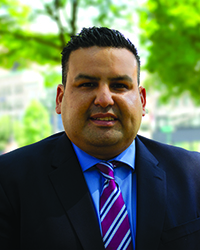It Is Time To Take A Hard Look At The Dual Tax Rate In Worcester
By Alex Guardiola, Vice President of Government Policy and Public Affairs
The continual shifting of the tax burden onto our commercial/industrial taxpayers is more impactful now more than ever. As we are finally starting to see a light at the end of the COVID tunnel, we must reflect on the damage it caused and the work that needs to be done to ensure that our city continues the economic development momentum that was started prior to shutting down the world.
It is time to start making some real changes to our tax system here in the City of Worcester. We hold our fate in our own hands. Unfortunately, over the past 10 years, our City Council has continued to divide our city pitting residents and businesses against one another.
Worcester has the 8th highest commercial/industrial tax rate of the 351 municipalities in the Commonwealth. Moreover, we are only one of three communities in central Massachusetts with a dual tax rate along with Clinton and Auburn. Two years ago, Fitchburg (another gateway city I might add) aggressively moved to a single tax rate realizing that they were losing businesses to neighboring communities because of the tax rate. Clinton has made it clear that they want to move to a single tax rate, at an incremental rate, in order to revitalize their core downtown business district. Auburn has continued to vote to narrow the gap between the dual tax to help their recruiting efforts and are already seeing dividends with Reliant Medical Group utilizing a large part of the declining Auburn mall.
During the pandemic we learned a lot. We learned that working together is a better recipe for success rather than passing the buck to one another. We learned that we could work differently. Going forward working in a hybrid/remote environment will be a norm in some industries. We learned that manufacturing is still a critical industry and should not be minimized but rather be expanded for the sustainability of our community. Had it not been for manufacturers we would not have had the ability to shift from making a widget to making personal protective equipment, medical devices, and of course manufacturing of the vaccines. Unfortunately, some tend to have a short-term memory when it comes to voting on the future of this industry by continuingly increasing property taxes on our businesses here in the city of Worcester. It is important to note that manufacturers here in the city are not only taxed with the commercial rate for their property but also taxed at that same rate for their equipment in their buildings. So, in essence, they are being taxed twice here in Worcester.
The continued debate of whether or not to have a dual tax rate is complicated and can be deceptive. Unfortunately, the way a business is taxed is inherently different from the way residents are taxed, which results in a great deal of confusion. Those in favor of the dual tax do not always have all the information needed to be fully informed concerning the long term and negative effects a dual tax rate could consequently have on our local economy and home real estate values. The perception of immediate tax relief to homeowners often overshadows the true downward spiraling “ripple effect” such a move typically has on the local economy over time.
A split tax rate is a significant sign to new and existing businesses that a city or town is not “business-friendly”. It is often one of the first, if not the first, question that new businesses ask when looking to locate in a particular location. Further, existing businesses who have been here for decades see it as a sign that the elected officials do not value their opinion and needs. Often when City Councilors decide on how they will cast their vote on the annual tax classification hearing, their politics take a front seat. I have continuously noted where they stand on this tax classification vote based on when the next election is (by the way, this is the last tax classification vote before the next City Council election). I often hear electeds talking about helping small businesses on the campaign trail, especially during and now after COVID. But their votes speak otherwise. Approximately 80% of U.S. businesses are considered “small” businesses. The Worcester Regional Chamber of Commerce is the largest Chamber in New England with approximately 2300 businesses across 40 communities in Central Massachusetts. 85% of our members are small businesses with 10 employees or less. Yet, because of triple-net leasing tenants of commercial spaces agree to not only pay their rent and utilities but also the maintenance of the space, the insurance and property taxes. This specific vote to continually increase the tax gap between the businesses and residents paints a very different picture of trying to help small businesses.
This year’s City of Worcester tax budget is $778,052,065. If we had a more fair and equitable tax rate, we would be able to lure more businesses to call Worcester home dividing the “$778-million-dollar pie” into more slices and essentially lowering all tax bills. Instead, we continually move out big companies like Prime Metals, for example, who employed thousands of residents in Worcester to a neighboring community because they are now paying less than half the amount in taxes than they would in Worcester. Now add the residual effects of moving all those employees. They are eating at Sutton lunch spots and picking up their groceries on their way home in Sutton. We are essentially taking thousands of people out of a Worcester business district and again hurting our small business owners who rely on those discretionary dollars.
As inflation rates continue to climb and supply chains are making it difficult to conduct everyday business, Worcester needs to take a hard look at how we can help our business community survive. Experts are predicting that in the next year the economy will be in a recession. We are fortunate to have a diverse economy here in Worcester with many different sectors, we are not reliant on just one, however, we are not immune to a coming recession if we do not strategize correctly. While folks may point to a good deal of development happening in Worcester, the majority of that work is focused on housing. If predictions are correct, the combination of high commercial taxes, work shortages, supply chain issues and a recession could be devastating to our business owners here in the city.
It is time to reconsider the trend of widening the tax gap here in Worcester and work towards a 10-year plan to narrow the tax gap. A single tax rate cannot happen overnight, but we must come together to put this plan in place in order to be the thriving metropolis we want to be going forward.





